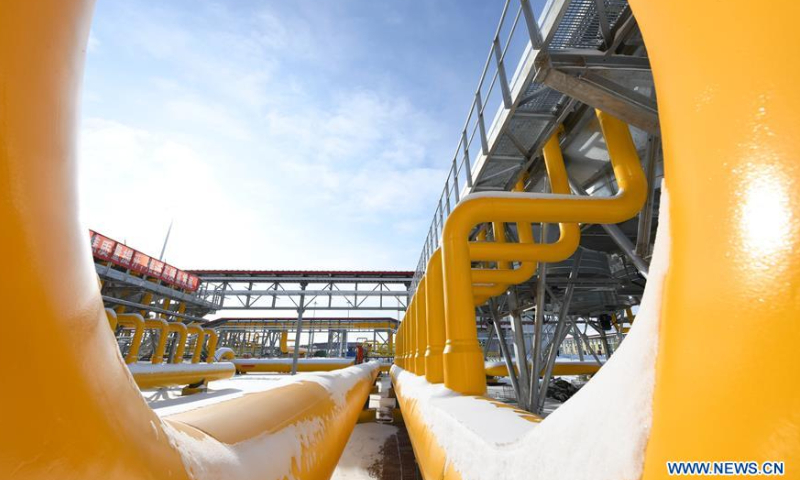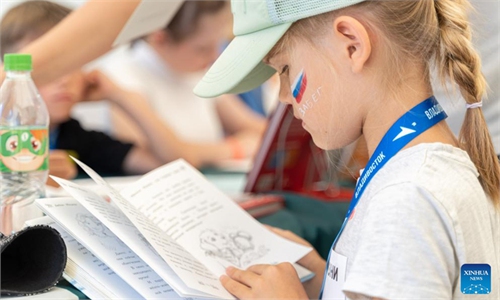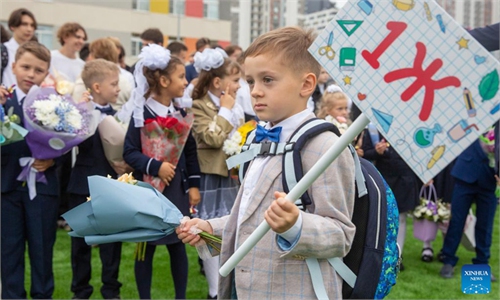EEF offers new venues for China-Russia cooperation
Western hostility, hype won’t deter business exchanges

The photo taken on November 19, 2019 shows the gas-distributing and compressing station of the China-Russia east-route natural gas pipeline in the city of Heihe, the first stop after the Russia-supplied natural gas enters China, Northeast China's Heilongjiang Province. Photo: Xinhua
Chinese observers and experts said that major outcomes involving China-Russia cooperation may emerge from the eighth Eastern Economic Forum (EEF), a major Russian platform for promoting global and regional cooperation. The forum kicked off on Sunday in Vladivostok, Russia.
As bilateral trade heads to a record high this year, the EEF will offer new venues for China-Russia cooperation to create prosperity and development in the region and improve people's livelihoods. Such cooperation will aid China's national strategy to revitalize its Northeastern provinces, Chinese observers noted.
Experts said that Western hype that China is economically aiding Russia, which is under Western sanctions, does not hold water, as China's pursuit of peace and development triumphs over the mentality of global power rivalry imprinted in the minds of some Western politicians.
The so-called economic blood transfusion theories stem from the hostile stance of the US toward China and Russia, but the world is no longer at the baton of some superpower, and normal business undertakings between China and Russia, which are conducive to the economic development of the two countries and the welfare of their people, will not change, they noted.
"Some Western countries hold an antagonistic view toward Russia whereas China and Russia see friends in each other. China's trade with Russia is aimed at improving people's livelihoods, and it bolsters regional development as well as security," Song Kui, president of theContemporary China-Russia Regional Economy Research Institute, based in Northeast China's Heilongjiang Province, told the Global Times on Sunday.
China, as an advocate of the international order, a representative of advanced productive forces, and a practitioner of regional cooperation and world economic integration, will continue to do business with Russia, Song said.
Song said that China-Russia cooperation, especially regional cooperation between China's Northeastern provinces and Russia's Far East, will be a highlight of the forum.
The EEF attracted 7,000 participants, including delegates from China, Myanmar, India, Mongolia, Laos and some delegates from "unfriendly countries," according to Russian news outlet Sputnik.
It is reported that one of the outcomes of the EEF may be the consolidation of an agreement between the leaders of China and Russia, Sputnik reported, citing Russian experts.
In March, China and Russia announced the Pre-2030 Development Plan on Priorities in China-Russia Economic Cooperation, a key statement issued by the two countries during the state visit of the Chinese top leader to Russia, aiming to further improve the quality and structure of rapidly expanding bilateral trade.
China's Foreign Ministry announced on Friday that Chinese Vice Premier Zhang Guoqing, also a member of the Political Bureau of the Communist Party of China Central Committee, would attend the forum at the invitation of the government of the Russian Federation.
"Lots of signals have been released - the building of a free trade area, the exemption of taxes, the opening of ports… so it is expected that some outcomes could be achieved in bilateral industrial cooperation, and the construction of cross-border industrial chain cooperation, which would promote the economic development of Russia's Far East and the revitalization of Northeast China," Song said.
Such cooperation, which focuses on peaceful coexistence, common development, complementary advantages, resource sharing and the flow of production factors, is not only important to China and Russia, but also significant to the global economy, which is facing an uphill battle on its track to recovery after three years of COVID-19 pandemic, Song noted.
Li Xin, director of the Institute for Eurasian Studies at the Shanghai University of Political Science and Law, told the Global Times on Sunday that the EEF offers a chance for Russia to attract foreign investors to develop its Far Eastern region.
Russia's role as a supplier of oil and gas, grain and timber could be further strengthened through exchanges with participating countries, Li said.
Chinese experts said the EEF could also provide opportunities that facilitate Russia's strategy to develop its Far East in synergy with China's revitalization of its Northeastern provinces.
In May, China's customs authority agreed to add the port of Vladivostok in Russia as a transit port for domestic transportation of goods in Jilin Province, following the participation of such trade arrangements of several other ports in the region. The move is seen as a milestone of the continuous progress of China-Russia border trade cooperation in recent years.
"Such a development that focuses on external opening-up could promote the industrial structural readjustment of Northeast China and hedge against risks stemming from industrial upgrading and population depletion faced by the region," Song said.
Thanks to continued cooperation and the improvement of trade infrastructure linking Chinese and Russian cities, it is expected that China-Russia trade will reach the $200 billion target goal this year, ahead of the 2024 schedule.
Experts noted that the investment willingness of Chinese enterprises is somewhat dented by some specific obstacles in bilateral border trade cooperation, such as the low customs clearance efficiency of the Russian side and the inadequate implementation of Far East development policies.




